Michael Krásný – bass-guitar player (English version)
13.08.2014 17:52 | Michaela Lejsková
Until I´ve met Michael Krásný, I didn´t have the faintest idea that there issomething like tailor-made guitars – which are, upon request, fabricated out ofdecayed wood. I equally didn´t know that musicians don´t listen to music likewe non-professionals do since music has an entirely different dimension tothem. Last but not least, I was surprised how much enthusiasm one canexperience in playing music and how specific it can be. Both enthusiasm andextraordinary desire emanate from all of Michael´s answers. At present, he iscooperating e.g. with Laco Deczi and their concerts are worth listening. It isobvious that this person chose a profession which entirely suits him. That´s Krásný.
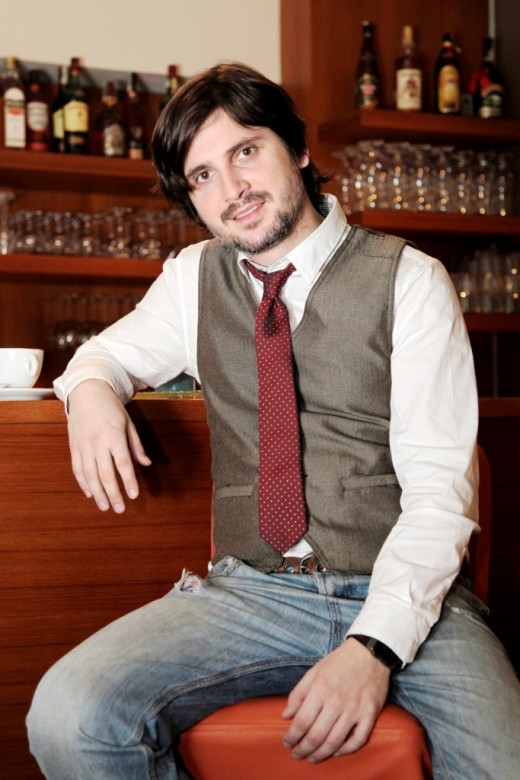
photo: Robert Vano
Where did your decision to play music come from?
Actually, I didn´t start playing music out of my interest. My parents strongly forced meinto playing the piano and I really didn´t want. I wanted to play sports. But I ended up asa young boy playing the piano and really hating this. Oh boy, I got quite a number ofslaps! Yeah that was crazy.
What changed?
Once, I got this song. The memory is still lively. I was at home, played the song andenormous emotions broke out. I really started to feel this song and was entirely shocked.I figured: “Well, there must be something about music.” That was how I actually startedto make music. Later on, it got better. When I for example visited a museum on a schoolexcursion and there was a piano, the girls in my class said: “You gotta play!” I was reallyshy but when I saw their faces... Well, and it was all clear.
Which song enchanted you so much?
An Affair to Remember by Harry Warren. Then Fibich´s Poem entirely got me, also W. A.Mozart´s Fantasia no. 3, and when I started playing the Preludium Cis moll byRachmaninov, I knew I got trapped! (Laughs)
What did the piano and the contrabass on which you are playing as wellcontribute to your current career?
Everything. It´s wrong to develop in only one direction, as it´s always essential to lookaround as much as possible and then things may happen. I actually played the contrabasson the elementary art school in the Silesian town of Opava. I liked the contrabass due toanother reason. I studied it in the class of a fascinating person, a globetrotter, Mr. Oldřich Jíra.
What was it that fascinated you on this person?
His attitude towards life. His idea was that there´s actually nothing to worry about, yougotta be cool and do your job. We always went to drink some beer and talked it all overand it was great.
So you were finally „merciful towards the piano“?
In the end, I enjoyed playing the piano too. Not only because it´s a compulsory subjectwhen studying at the conservatory. It´s helping me until now because when you arecomposing, there´s little to compose for a bass-guitar. But I can play anything on thepiano. And I also use the contrabass relatively often until now, for example at home whenI´m recording.
Didn´t you ever think of focusing only on the contrabass?
I had been thinking about this a lot. When I was 18 and playing the contrabass, I tookpart in a nationwide string instrument competition. I had been preparing myself for thisoccasion for one year. You practice these things again and again, I already got reallyexhausted. Well and then I came there and won this competition and even received aspecial jury award. Naturally, me and my teacher boozed ourselves off. Next morning, Istepped out of the hotel and we could say that my head was empty. I absolutely didn´tknow what I was going to do. At that time my teacher arranged for me getting a job inthe Janáček Philharmonic Orchestra and I thought that I was, probably, going to play thecontrabass because at that moment, it appeared that it was to be this way. But suddenly,I got stuck and wanted to play jazz so I went to Prague and studied jazz at the JaroslavJežek Conservatory.
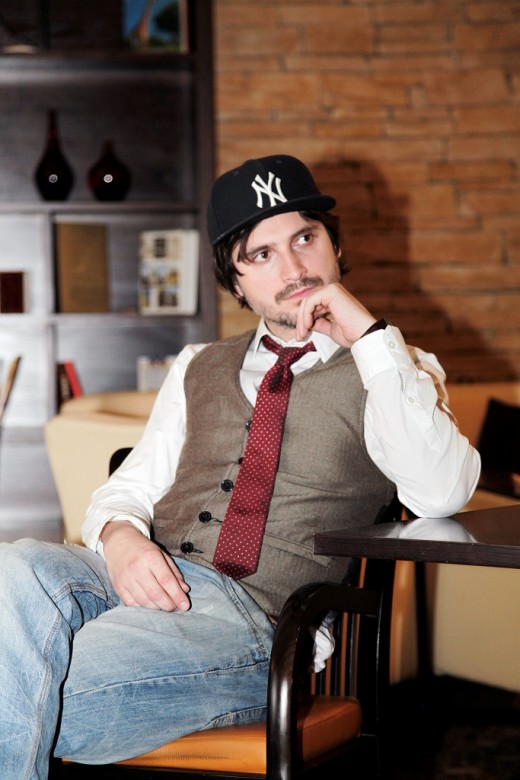
photo: Robert Vano
And when did you touch a bass-guitar for the first time?
My brother started playing songs on the guitar and I liked them, so it seemed entirelyautomatic and natural to me that I started playing the bass-guitar. I had this feeling insidethat I simply had to. My first bass-guitar was my brother´s old six string where I removedthe upper two strings, having thus only four left like on a bass-guitar, and I twanged justlike this. I thought that I wanted to play the bass-guitar.
And your first real instrument?
My father bought me my first bass-guitar when I was about thirteen. I was really thrilledby this and kept playing on it for the next four years. Then I earned the money for myfirst tailor-made instrument. But when I was fourteen, I simply decided that I would playthe bass-guitar.
So bass-guitars arte tailor-made?
Surely, there are companies manufacturing the – we could say – industrial guitars, likeFender does. These are renowned, world-famous brands that have been doing thissince the 1930s and they produce great instruments. It´s a classic. Then there areinstrument builders who are much more expensive, but the sound is completely different.The instrument I currently use is made by Aleš Vychodil and it´s a piece of art. It´sabsolutely incredible.
How is the bass-guitar manufacture organized?
You start with the shape. We´ve been discussing it for almost three months, I keptredrawing the shape so that it suited me. Then you select the wood, because there´s anincredible amount of sorts of wood, it´s an entire alchemy and philosophy. I chieflyfocused on getting an acceptable colour and resonance. We finally opted for decayedmaple root. As the title itself alludes, it´s a partially decayed maple root which is thendried and sliced. And these slices then have a specific colour due to the decay process.Well, that´s my bass-guitar.
Is there anything the bass-guitar playing does give you?
The greatest freedom one can ever have. Mostly, you have to bow down in order tosurvive. Me to, that´s clear, but in a way, I can drop down anything I want. It gives meabsolute freedom.
Did you ever have a classical job?
I´ve worked in an office where you simply have to get up and go to work. I had beendoing this normal kind of job for several years, but at the same time, I kept playing musicas well. Well and finally, it all became clear and I said to myself: “No more. I won´t dothis anymore, I don´t need to and above all, I don´t want to. From now on, I only wannadevote myself to music.” Actually, until I was twenty-eight, I kept dancing at two partiesat once.
On, we could say, two extremely different parties…
First, I studied electrotechnics, photovoltaic energy and all the related issues at the CzechTechnical University in Prague. At the same time, I was studying at the conservatory andthen the Jaroslav Ježek Higher Vocational School (Vyšší odborná škola Jaroslava Ježka). Ikept running from one school into another, from one job to another. Well and suddenly Ithought: “That´s enough. I needn´t do this anymore. I´ll earn my living with either of myopportunities.” So I opted for music and started doing only music.
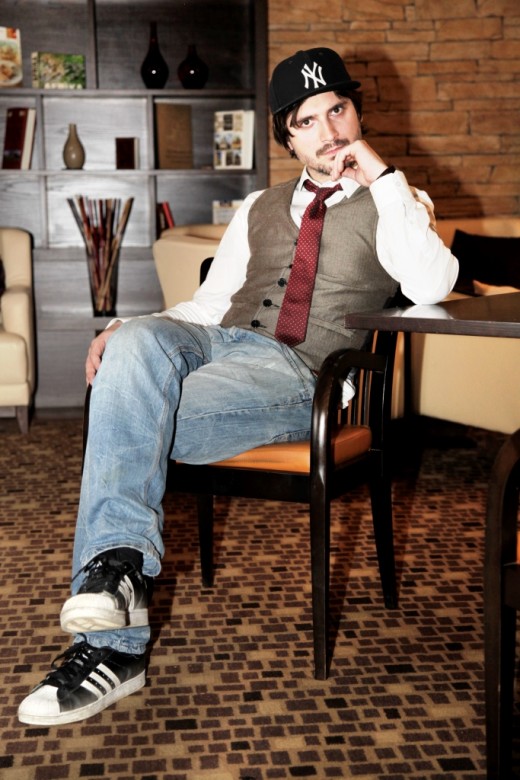
photo: Robert Vano
So a slow-down?
Not at all. I have to say that I was working frantically. Every morning at eight o´clock, Igot a depression from not doing anything. So I immediately started doing something. Be itcomposing, acquiring orders or managing the band. Once I came across the famous Czechsinger Dan Bárta. So I sat down for one evening and rearranged a song for him – it´scalled On my head and was the soundtrack of the Czech teen-movie Snowboarďáci(Snowboarders). It´s a very nice part, he sang the song absolutely great. I didn´t evenexpect the song to sound this way.
So this was the start of your cooperation?
Yes, this marked the start of our cooperation. He then christened my CD and in about oneor two weeks, Laco Deczi called me, saying he wanted me to play in his band. Weimmediately began a natural conversation and it was great.
What made you as a music lover study at the Czech Technical University?
I´ve loved mathematics since when I was a child and I took part at several so-calledmathematics and physics competitions and won those competitions. And I always enjoyeddiving into these numbers because this was an entire universe to me. To me, mathematicswas something that never lies.
So you never regretted not focusing more on music instead of studying?
No, I believe that this choice was important to me because it formed my personality. Apartfrom that I had many economic subjects at the university. If I were just a musician Iwouldn´t have the faintest idea of how things actually work or how they can work. Duringthe university studies, we had to found about six virtual companies, set up their profit andloss statement and state how we got to our results.
In how far is this positive for music?
If you focus merely on music, your economic thinking shrinks, and if you don´t haveenough money you can´t make a record and cannot do these things. It´s allinterconnected. If you study only music, you can only compose a song and then whenyou´re twenty, you do not know how things around you happen and what it´s all about. Isimply believe that this decision gave me much and I´m thankful for it.
How much time of your artistic career does economic thinking swallow up?
All of it. (Laughs) Laco Deczi keeps saying: “You practice at home and only until you´renine.“ But of course, he´s practicing until now and me to. Yet at the same time, you´reon the phone, checking your emails, and you´re permanently organizing, counting,arranging something... It´s a full-time job. And in the evening, you go to play at aconcert, that´s the icing on top of an already excellent cake. Your reward, because youget the chance to play.
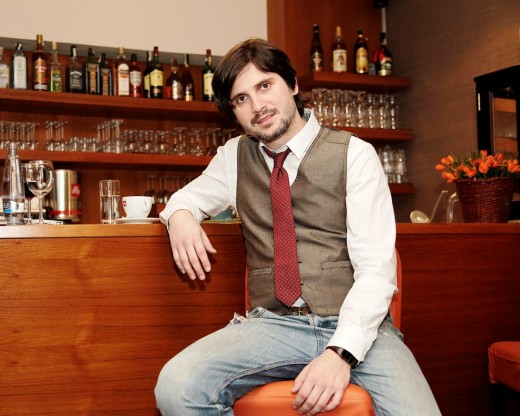
photo: Robert Vano
And how often do you practice?
Of course every day. When you´re on tour, playing every day, you don´t change theparts. It may happen that you add one composition or two. But apart from that, you playevery single day, remember what you played the evening before, what went wrong andwhat was good, and you thus know what you can afford to do and what you cannot.Consequently, your approach is to strive for perfection and in the end, you´re actuallypracticing right at the moment of your performance. I´ve already managed the technicalpart of playing and I do not believe that there´s anything I couldn´t play. But it´s alwaysabout knowing what to play. That´s what makes it difficult. Nowadays, I rather thinkabout melody and groove, than trying and practicing it.
What do you consider to be your greatest success?
This interview. (Laughs) My success up to this moment is that – thanks to what I lovedeeply in my heart – I´m able to earn my living and can afford a home, food and I caninvite a girl to the cinema...
And what about obstacles?
I believe that no musician has an easy life. I believe that it´s easy to complain but I´mnot one of those guys who are into this. In a way, every day is an obstacle, you have toget up and work…
The greatest breakthrough in your career?
I think it was when Laco Deczi called me – that was a fundamental change. I startedstudying at the conservatory but I didn´t have a clear idea of what I was doing. But mytechnique was fine. I acquired the reputation of an absolutely demonic bass-guitar player.Simply anybody who met me just said “wow” but I never got a job.
Why?
Because everybody thought that if I´m so good I´ll have enough jobs. But I didn´t playanywhere, I didn´t have jobs at all. So I complained now and then but then I startedfinding jobs myself and began working on this. That´s a turnover every musician comesto, I guess. It started working and suddenly, I had more bands I was taking care after,and bands which received jobs from me and at the same time, this was the time when Imet Vaico Deczi.
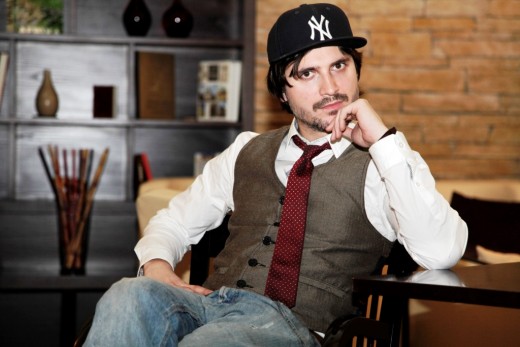
photo: Robert Vano
So a fateful meeting?
At that time, I was completely clueless because I didn´t have a drummer and suddenly,Vaico came out of the neighbouring rehearsal room and I gave him this job. So we played,he liked it very much and said that he´d tell his father, Laco. Well and I thought – sureyou will. I was used to music people promising heaven and earth. That´s what Iexperienced travelling all around the world. Two times it happened to me that somebodyreally kept his promise, one of these occasions was Vaico.
In what sense is Laco Deczi extraordinary to you?
He really is extraordinary. I´ve cooperated with many people, bands, stars in this country.But he is one of a handful of people I can honestly call a genius. To me, Laco is mentor inregard of my occupation, music, arts but in a way also as far as the personal sphere isconcerned. I´ve neither ever met anybody as ingenious as him, neither do I believe I everagain will. He´s seventy-six and he´s playing like a devil. He´s being creative all the time,he´s painting for example, also creating his own truthfulness stories and he´s living a lifeas if he was 20. He´s extraordinary. He won´t tell much about himself, and if he does,it´s mostly some funny story, but if he seriously spills out something about his life, thenyou´re just amazed. (Laughs)
What does the cooperation with him mean to you?
(Laughs) It needs strong nerves, solid health and an instrument casing filled with vitaminpills and tranquilizers.
How would you characterize the music you compose together?
I don´t know. It´s jazz. Yet actually, it´s not jazz. If somebody listening to a Czech radiostation heard our performance, it would sound like jazz to him. But if we tell a jazzmanthat what we are playing is jazz, he´ll probably even break out crying. But what´s decisiveis that this music somehow works and people like it. Today, they are buying our CDsmuch more than they did two years ago, the band is working really good, all our concertsare sold out and lately, our audience even started dancing to our music.
How do you feel at your concerts? Is it necessary to rehearse before them?
You have to rehearse your repertoire. New parts that we present to the band need to beplayed first, rehearsed and above all, you have to shape them. I always say that the songis somewhere there but one has to find it. And that needs time. Sometimes you can´t findthis little something, so you put the song in the drawer and then this little something popsout and it´s there and it´s there immediately. But talking about interpersonal stuff, itneeds to be said that “everything matched damn well” and we didn´t have to talk aboutanything too much. We knew right when we met that it´s ready and that we needn´t talkabout it anymore. During the first rehearsal, we fine-tuned some titbits which areimportant and we went on tour. There weren´t any problems to be discussed.
And what about the concerts?
Actually, the whole tour always means relaxing. You can just play and be part of it, nothaving to deal with anything else. You do not have to care about travelling, sound, hotels,your life problems, your angry girlfriend, your dissatisfied lover number one, yourdissatisfied lover number two... (Laughs) Now both start quarrelling about who is themore dissatisfied lover... (Laughs) You just only rely on the other guys and do only whatyou know you can do best. Above all, you can stop thinking, stop thinking at all, stopthinking about anything and that´s so liberating. You´re happy.
How does a preparation for your concert look like?
I just arrive at the venue, get to the stage, tune in my bass-guitar, check the sound, andif everything is all right, I drink a cup of coffee, chat a bit with the guys and go playing.(Laughs.) Earlier, it has been a bit different – when we were playing with Gaia Messiah,we always ran a bit ahead of the concerts and maybe did some press-ups in order to getendorphins into our body and in order to be able to hand them over to the people. Thatwas rock music and it was necessary playing it.
You´re the co-founder of Quattro Formaggi and still playing in this band. Whatmade you found this band?
Well actually, I´m not the founder of this band, but when I was some sixteen years old, adrummer I was cooperating with asked me whether I´d like to play jazz with him. So Isaid: “Well sure.” Well, and then once he came saying that the band´s name was going tobe Quattro formaggi and I answered “OK.” Then the band started to break up and Ibrought in some of my schoolfriends. Once, we played together and found out that itworks perfectly and we´re playing together still. It was a fateful meeting and it´s a greatcooperation.
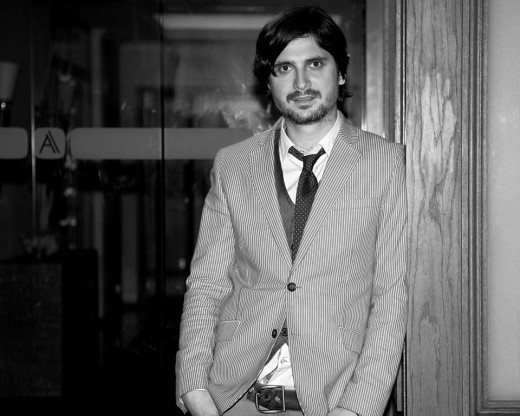
photo: Robert Vano
What´s important in such a band?
The symbiosis between the bass-player and the drummer is the absolutely most importantingredient for the band smoothly working together. If these guys don´t match, it doesn´twork.
What scale do you use to evaluate a concert?
The audience is the scale. Frequently, and especially in jazz, you get the feeling of havingjust played something that´s absolutely great and a breakthrough, but the audienceshows no reaction, because they haven´t been on the same wavelength with you with youat the concert. At concerts, the communication between you and the audience is the mostimportant aspect. The more the people return to you, the more you put into them.
Do you like listening to your music?
Listening to oneself is the biggest torture on earth. That´s horrible. The maximum what Ido is listening to something I did a year ago because you keep on growing anddeveloping. After one year, you may chuckle at your work: “Well, that was when I wasdoing this...” But it´s always important to concentrate on what´s happening now and at amaximum what lies ahead not more than ten minutes.
Where do you draw your inspiration from?
I don´t know, let´s say I´m just driving in my car, I start singing something and say tomyself: Well that´s interesting, if I´m gonna forget this...” So I record it on my mobilephone and when I get home, I start working on it, creating a harmony or a melody to itand mostly, I let it be then. And then I listen to such a piece again in about a month andthink: “Wow, there´s something about this.” Then I work on it further and suddenly,there´s a new song.
So there are no moments when you tell yourself that you are simply going towrite something?
Writing on purpose, just sitting down and writing a song is difficult. But mostly, youmanage to create something that way. Sometimes you play it two or three times, take itor leave it then and on another occasion, a good song may be ready within ten minutes.To me, it´s all based upon me having some experience of life thanks to what I haveplayed or heard in my life, or what I have devoted myself to. So not thinking about all thisand just picking out the tones, it all suddenly works. Or it doesn´t. And if it doesn´t work,you think about it a bit more and you figure: OK, this thing in here isn´t too good or thatthing over there would still be nice. You select those variants that somehow come intoyour mind, but I don´t know from where. So this is how you make your choices accordingto your taste and how it´s all done.
Can you still listen to the music like non-pros do?
No, I cannot. That´s like an ice-hockey player watching ice-hockey. He recognizes thingswhich somebody who just likes hockey doesn´t see at all. The ice-hockey player watchesthe game as a professional. Listening to a song, I feel the whole spectrum of how it isrecorded, what instruments are playing, what is actually being played and why. Millions ofthings. The greatest torture for me, is to have sex while some music is playing. Iabsolutely can´t manage that now whereas earlier, it was absolutely normal. Earlier, I justput on some music that created an atmosphere. But nowadays, I turn on music and thenit just doesn´t work. You start thinking about music and not about what you should. Iactually don´t know any more how you listen to music usually, and that´s the magic.
Magic?
That´s what I like about Laczo. Laczo is playing for everyone and his music appeals toabsolutely everybody. But the audience can´t hear the music the way we do. What theycatch up and what we catch up doesn´t match to more than ten percent. They hearsomething in our music what I do not understand at all. Not anymore. I´ve crossed someborder. Every single musician who starts devoting himself to this crosses that border. Hedoesn´t know at all and can only guess that he´s right in what he´s saying, that whathe´s saying is beautiful but he can´t imagine at all how a non-musician experiencesmusic, why the non-musician actually experiences music that way and why he wants itthat way.
How would you characterize your career at the moment?
Perfect.
So do you still dream about something in your work?
In short, I´m going to edit my first solo CD. I´ve recorded some parts on my ownwhereas for other songs, I´ve invited friends of mine, guests, recording takes place in myhome studio and I´m curious how things will work out. My dream is to get ready untilJuly. The next dream is to maybe christen the CD and that people come to the CDchristening, hear the CD and like it and maybe buy it.
When we mention music, what comes up in your mind first?
Love. That´s about it.
But the list of your activities we have already mentioned in this interview is notcomplete...
Every Wednesday, after midnight, I´m leading a jam session in Sherlock´s Pub, andmusicians from the whole city of Prague as well as from all over the world get there.We´ve already played with a female singer from Australia, a guitar player from theRepublic of South Africa, a saxophone player or drummers from England, from NewYork... Sometimes even famous guys come around to play. It´s a great party. Songspeople know are being played and singers come to the pub who just wanna sing becausethere´s a party. Cooperating with Milan Svoboda who led me at the Jaroslav JežekConservatory and taught me much about harmony and composition was interesting. Iplayed with him both in a big-band and in a quartet. Then I´ve got also one more band,the Top Dream Company, which actually is a ten-member combo, an almost bigbandygroup and it´s great. Furthermore, I accompany the Czech singer IvetaBlanarovičová at her concerts, at the concerts of her foundation by the name of LaSophia, where I work not only as a teacher for children but also provide musicalaccompaniment at evening parties and gala concerts where the children perform.
How can you unite such a musician´s life with private life?
Wonderfully. (Laughs) If you are an entrepreneur, private life becomes a bit more difficultthan when you´re working eight hours a day, where you can be sure of what you get andthen you return home and can focus on your private life. But being a musician, yourprivate life is public which in turn means that you live your private life publicly. There´s noother option because if one was to preserve the classical eight-hour-working-day-model,then both such a person and his/her partner would go crazy. To me and with regard tomy life, the fundamental thing is rather not thinking about all this too much... What doesa fish know of the water, in which it swims? I think Albert Einstein said this. That´s abouthow I see it. I love my work above all and that why I try even more to do my work asgood as I can. My private life doesn´t suffer from that, it rather flourishes.
Thanks for the interview.
Text: Petra Kuncová
Photographer: Robert Vano www.robertvano.cz
Created in cooperation with the ALWYN hotel www.hotelalwyn.cz
Proof-reading: Alžběta Strnadová
Production: Michaela Lejsková
Publisher: Profesní magazín Best of www.ibesof.cz

Komentáře
02.02.2025 | Věda a výzkum
 Kategorie
Kategorie
Příbuzné články
10.06.2024 | Vystudoval polygrafii a Obchodní akademii v Praze. Řadu let působil jako profesionální a umělecký ...
15.04.2024 | Narodila se v Příbrami, ale nejvíce vzpomínek má na Prahu. Vystudovala Střední odbornou školu ...
18.11.2022 | Marta Balejová patří mezi nejvýznamnější české šansoniérky současné doby. S hudbou začala ...
24.10.2022 | Markéta Fassati vyrůstala ve světě hudby odmalička. Narodila se do rodiny dirigenta, sbormistra ...
19.09.2022 | Podmanivý hlas mladého zpěváka je skoro k nerozeznání od originálu. Ačkoliv se narodil v Praze, ...
Newsletter:
Best of ... na Facebooku! Nejčtenější články za měsíc


















